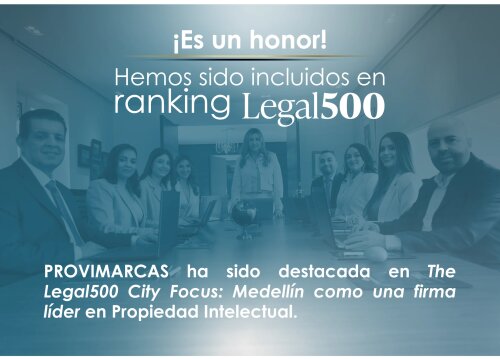Best Agriculture Lawyers in Bogota
Share your needs with us, get contacted by law firms.
Free. Takes 2 min.
List of the best lawyers in Bogota, Colombia
About Agriculture Law in Bogota, Colombia
Agriculture plays a significant role in Colombia's economy, and while Bogota itself is a major urban center, it is surrounded by fertile agricultural regions that feed its population. The legal landscape regarding agriculture in Bogota encompasses a mix of national regulations and local ordinances that govern land use, zoning, agrochemical application, trade, environmental protection, and labor in agricultural activities. Additionally, issues such as food safety, urban agriculture, and sustainability have become increasingly important within the city's policies. For anyone operating or planning agricultural activities in or near Bogota, understanding the applicable legal frameworks is essential for compliance and sustainable operations.
Why You May Need a Lawyer
There are numerous instances where seeking legal help in agriculture within Bogota is crucial. Common situations include:
- Securing land use permits and navigating zoning regulations
- Drafting or reviewing contracts for purchase, lease, or sale of farmland or produce
- Compliance with labor laws regarding farmworkers
- Handling disputes over property boundaries, water rights, or crop damage
- Managing environmental compliance, including waste management and use of agrochemicals
- Facilitating foreign investment in agricultural projects
- Dealing with government support, subsidies, or participation in rural development programs
- Protecting intellectual property such as seed patents or farming technology
A lawyer specialized in agricultural law can help ensure your operations comply with current laws, avoid penalties, and support dispute resolution processes.
Local Laws Overview
The main legal framework for agriculture in Colombia is set by national law, but local ordinances and regulations from Bogota's district government further refine how agriculture is practiced within and on the outskirts of the city. Key aspects include:
- Land Use and Zoning: Certain zones are designated for agricultural use, and urban agriculture initiatives are promoted through specific policies.
- Environmental Protection: Strict regulations exist to prevent deforestation, manage waste, protect water sources, and regulate pesticide usage. Penalties for environmental violations can be severe.
- Labor Law Compliance: Farm owners must adhere to workplace safety standards, minimum wage laws, and regulations regarding employment contracts for agricultural workers.
- Food Safety: Controls are in place for food production, storage, and distribution, managed by local and national entities.
- Trade Regulations: The movement and export of agricultural goods are regulated, with attention to phytosanitary requirements and customs laws.
- Agrarian Reform and Rural Development: National programs aimed at improving rural livelihoods also affect agricultural practices around Bogota.
Frequently Asked Questions
What permits are required to start an agricultural venture near Bogota?
Depending on the type of agricultural activity, you may need land use permits, environmental licenses, and registration with the local agricultural authority. For urban agriculture, special permits may be available through Bogotá's District Secretariat for Rural Development.
Are there incentives for sustainable farming in Bogota?
Yes, both national and district programs may offer incentives for sustainable or organic agriculture, including tax breaks, technical support, and access to certain funding opportunities.
What are my obligations regarding the use of pesticides or fertilizers?
You must comply with environmental regulations on the safe storage, handling, and disposal of agrochemicals. Illegal use or overuse can result in severe sanctions by authorities such as the Ministry of Environment.
Can I engage in urban agriculture within city limits?
Yes, urban agriculture is supported in certain zones of Bogota. You must follow local zoning laws and register your activities with the appropriate municipal authority.
How are labor rights enforced on farms?
Agricultural employers must register workers, provide written contracts, pay at least the minimum wage, and ensure a safe working environment. Violations may result in fines or criminal charges.
What should I do in case of a land dispute?
Consult a lawyer experienced in agrarian law as soon as possible. Documentation of land titles, boundaries, and prior use is crucial in resolving these disputes.
Are there restrictions on exporting agricultural products?
Yes, exports are subject to compliance with sanitary and phytosanitary measures, licensing, and trade agreements. The Colombian Agricultural Institute (ICA) is the main regulatory body.
Where do I report environmental violations observed in agricultural operations?
You can file a report with Bogotá’s environmental authorities or the Ministry of Environment and Sustainable Development. They will conduct necessary inspections.
How does agrarian reform affect property rights?
Ongoing agrarian reform initiatives may affect land tenure distribution, especially in rural areas close to Bogota. Always verify the legal status and history of any rural property before purchase.
Can foreigners own agricultural land in Bogota?
Generally, foreigners can own agricultural land in Colombia, though there are some restrictions near national borders and on land classified as national reserves.
Additional Resources
For those seeking further information or assistance on agricultural law in Bogota, the following entities and resources may be helpful:
- Bogotá District Secretariat for Rural Development - Oversees agricultural policies within the city
- Ministry of Agriculture and Rural Development (Ministerio de Agricultura y Desarrollo Rural) - Responsible for national agricultural programs and regulation
- Colombian Agricultural Institute (ICA) - Handles phytosanitary certification and oversees plant health
- Ministry of Environment and Sustainable Development - Enforces environmental laws and licensing
- Chamber of Commerce of Bogota - Provides information on business formation, permits, and local regulations
- Legal Aid Organizations and University Law Clinics - Offer guidance and legal assistance on agrarian matters
Next Steps
If you need legal assistance in agriculture in Bogota, begin by gathering all documentation related to your case, such as contracts, land titles, business permits, or correspondence with authorities. Write down a clear summary of your situation and what outcome you hope to achieve. Then, contact a qualified attorney who specializes in agricultural law or consult with local legal aid organizations. Many legal professionals offer initial consultations to help evaluate your case and recommend a course of action. Engaging with the recommended governmental and professional bodies listed above ensures you receive updated information and connects you with valuable resources relevant to your situation.
Legal requirements in agriculture can be complex, but with informed guidance, you can navigate them efficiently and protect your interests in Bogota.
Lawzana helps you find the best lawyers and law firms in Bogota through a curated and pre-screened list of qualified legal professionals. Our platform offers rankings and detailed profiles of attorneys and law firms, allowing you to compare based on practice areas, including Agriculture, experience, and client feedback.
Each profile includes a description of the firm's areas of practice, client reviews, team members and partners, year of establishment, spoken languages, office locations, contact information, social media presence, and any published articles or resources. Most firms on our platform speak English and are experienced in both local and international legal matters.
Get a quote from top-rated law firms in Bogota, Colombia — quickly, securely, and without unnecessary hassle.
Disclaimer:
The information provided on this page is for general informational purposes only and does not constitute legal advice. While we strive to ensure the accuracy and relevance of the content, legal information may change over time, and interpretations of the law can vary. You should always consult with a qualified legal professional for advice specific to your situation.
We disclaim all liability for actions taken or not taken based on the content of this page. If you believe any information is incorrect or outdated, please contact us, and we will review and update it where appropriate.
















